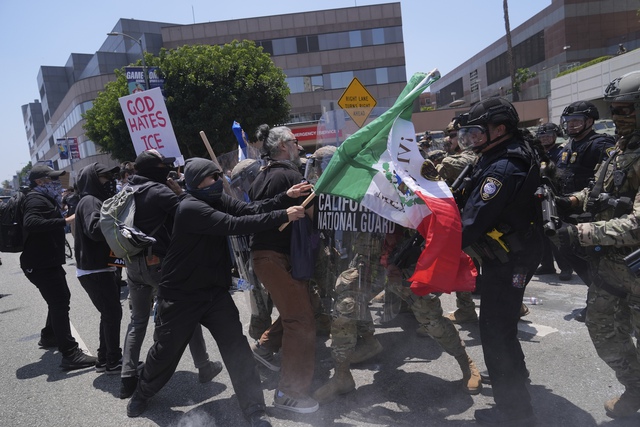War Stories
War Stories
Alex Garland and Ray Mendoza take on the Iraq War Warfare| A24
Warfare| A24 o
r
d
F
a
c
t
o
r
y
Over a decade after the disastrous end of a heedless military misadventure abroad, one director released a film that he hoped captured in exacting detail the essence of American cruelty and hubris. Informed by real-life combat experience, he had labored to create the most authentic depiction to date of the soldier’s experience in a bloody war that Congress never officially declared. Before filming began, the young cast was made to undertake an extensive military-style training regimen; the movie was then shot, unusually, in near chronological order. The film I’m speaking of is, of course, Oliver Stone’s Platoon, but you’d be forgiven if you thought this was about Alex Garland and Ray Mendoza’s Warfare, the latest film to take as its subject the United States’ war in Iraq.
Platoonopens in late 1967 and follows a unit of American infantrymen along the Cambodian border. Loosely based on Stone’s experience, the young Chris Taylor (Charlie Sheen) is torn between competing visions embodied by Sergeant Barnes (Tom Berenger), a harsh cynic, and Sergeant Elias (William Defoe), a Christ-like figure who works to maintain moral clarity amid the violence. Stone said the aim of the film was to “make a document of a time and place,” to show “what it was like to be there” on the front lines of the war. The film, which would go on to win four Oscars, including for Best Picture, struck a nerve. “It is a rare film in that it tries to re-create the grim chaos of combat. And it is likely the first film about Vietnam to give a sense of the persistent fear, discomfort and hard labor of fighting there,” wrote Michael Norman in his review for the New York Times. Officials from the Department of Veterans Affairs estimated that there was around a 25 percent uptick in demand for PTSD treatments in the months following the film’s release, with many veterans saying it had been a trigger. Psychologists, however, said the movie was helping ex-G.I.’s process memories and speed the healing process. The American public, it seems, was ready for an ugly story of American cruelty and stupidity in Vietnam.
It remains to be seen if American audiences today are ready to confront the Iraq War to the same degree. Warfare is a small, foul, and claustrophobic film that follows a small detachment of Navy SEALs in late 2006 in the city of Ramadi, the capital of Iraq’s Anbar Province. Tasked with setting up an observation post, they take over an Iraqi home and hold its occupants hostage while a sniper records the patterns of life in the neighborhood. The quiet eventually erupts into a firefight with al-Qaeda insurgents that leaves an American-allied Iraqi dead, two Americans horribly maimed, and a house in ruins.
Hollywood’s depictions of the Iraq War, and the global war on terror more broadly, have been a mixed bag at best.
While Platoonblends realism with allegory to probe the morality of war, Warfare is interested mostly in technical accuracy. Garland brought on Mendoza, a veteran of the Iraq War, to be a technical military advisor; he holds credits as both cowriter and codirector. As an opening title card states, the entire film is based on the memories of those who were present that day, including Iraqis. All the marketing around the movie has focused on this slavish devotion to authenticity, from behind-the-scenes videos to nearly every interview with Garland and Mendoza. The production, for instance, recreated a section of Ramadi, as well as the house where nearly all of Warfaretakes place, based on photographs taken directly after the action depicted in the film. The actors participated in a three-week boot camp, and some even met the men they were portraying. While filming in sequential order, large speakers hidden off-set mimicked the sounds of Iraqi street life and combat to immerse the actors more fully. All of this lends the film an apparent sheen of objectivity, a sense of authority.
When it comes to the realities of combat or the needless squander of American and Iraqi lives, Hollywood’s depictions of the Iraq War, and the global war on terror more broadly, have been a mixed bag at best. Take, for example, 2014’s American Sniper, directed by Clint Eastwood and starring Bradley Cooper as real-life Navy SEAL Chris Kyle. Like Warfare, much of the action of the film takes place in the same city of Ramadi—but the Ramadi of American Sniper might as well be on the moon. Well, actually, it was California. Based on Kyle’s memoir of the same name, the film portrays the enemy as cartoonishly evil, and Kyle’s biggest flaw is that he is haunted not by the lives he took (Iraqi) but by those he couldn’t save (American). The result is cliché-riddled schlock that feels completely unmoored from the broader reality of the conflict, a film whose only coherent message is how the war on terror destroyed American fighting men in mind and body.
Or consider 2012’s Act of Valor, not least because it stars Mendoza playing a version of himself, a Navy SEAL at the center of the action. The plot of the film is secondary to its central gimmick: having active duty Navy SEALs play themselves. In a series of set pieces designed to showcase all the facets of their specialized training and hardware, the movie serves as a precursor to Warfarein its abiding investment in the minutiae of tactics and equipment. But in the end, it plays like an entry in the Call of Duty video game franchise, complete with bad acting, digital maps, and on-screen personnel files as character introductions—a devotion to mechanical realism without any interest in the world or the interiority of its characters, let alone those of the war’s victims.
A more direct forerunner to Warfareis the HBO miniseries Generation Kill, written by David Simon (of The Wirefame) and Ed Burns, and based on a book of the same name written by the late Evan Wright, a reporter for Rolling Stonewho embedded with a battalion of Marines for the first weeks of the 2003 invasion of Iraq. Released five years later, the miniseries has a similar devotion to hyperrealism as Warfare. Much of the dialogue is lifted directly from Wright’s book, and little idiosyncratic details of the Marines’ kits were faithfully replicated. The men, who spend equal time fighting the enemy and dealing with the incompetence of their officers, are the beating heart of the series. Risks are taken for no apparent reason, civilians are killed due to a lack of proper communication, and nearly every “mission” they go on is either ill-advised, without a clear objective, or redundant. It is only in the last episode, when the excursion comes to an end and the Marines arrive in Baghdad, that the characters begin to grapple with the broader mismanagement of the war. Confronted with deteriorating conditions and growing sectarian violence, the Marines are unable or barred from helping, hamstrung by a lack of interpreters and constantly being moved. “They’re screwing this up,” one sergeant fumes. “Don’t they fucking realize the world already hates us?”
While these films are often made with the wider American public in mind, Mendoza, in press for the film, has claimed that Warfare was really made for an audience of one: his friend Elliot, portrayed by Cosmo Jarvis in the film, who survived the 2006 battle depicted but has no memory of it. “I wasn’t going to compromise from keeping it honest and true,” he told The Hollywood Reporter, “because it was going to be the memory that was going to be given [to Elliot]. I didn’t want him to have a lie in his head.” It is also deeply personal for Mendoza, a reenactment of a foundational trauma that shaped him. Don’t we all wish we had a tape we could play back of some event in our lives to show our loved ones, to say, “Look, this is why I am the way I am. Now can you understand?”
The result is a film that unfolds in near real time, with bursts of great violence and lulls of nerve-racking boredom; there is no climax, no proper resolution. The Iraqis are afterthoughts, if not to the film then certainly to the SEALs. When insurgents do finally attack, the men are left exposed on the top floor and quickly assemble to get to the first floor. Revealed throughout Warfare, side by side with the violence and, yes, bravery, is a startling level of incoherence and lack of purpose that nears hubris. Their objective of “observation” is undermined by the SEALs’ inability to stay quiet; when an attack seems all but certain, no effort is made to mitigate their risks. One of the most successful scenes comes when SEALs struggle to move downstairs after a grenade blast. Ready to move, they are held up as they struggle to gather all their equipment. The ability to create tension from logistical struggles like this grounds the whole project, distinguishing it from other films of its ilk that relish in expurgated action sequences and quick cuts.
If you have heard one thing about Warfare,it is likely about the sound design that will leave you reeling. But what is truly remarkable is the silence that descends when the Americans finally do leave. As the men bundle into their Bradley fighting vehicles and depart, the viewer stays behind. The Iraqi family, no longer held hostage, ventures out into their destroyed home. The floor is soaked with blood and the remnants of combat: spent shell casings, used morphine auto-injectors, blown out windows, and bullet holes in the walls.
Outside, slowly, insurgents walk into the middle of the street; they place their arms on each other’s shoulders. This last scene stuck with me long after leaving the theater, and I found much of the meaning of the film in those two or so minutes. As soon as it comes to an end, however, the credits do not immediately roll; instead, the viewer is treated to a confusing montage of side-by-side photos of the actors with the SEALs they played (with nearly all their faces blurred out), along with photos of the real house and street in the immediate aftermath of the events depicted. There are also some behind-the-scenes shots of the veterans visiting the set while filming, which helped underscore the near-“reenactment” nature of the movie. The choice to omit Americans from the final scene felt refreshing in that it acknowledges that this world existed before and after the SEALs were there. To then re-center on the Americans in this montage was a return to the standard MO of American war film.
You may ask, “Who won?” The answer is no one. In this way, Warfareserves as a microcosm of the war in Iraq. A tale of American forces blundering into a foreign land, with no clear objective, and leaving only destruction in their wake. There is individual courage, sure, but there is also hubris, ugliness, and fear. No territory is gained, no military objective accomplished. There is, quite simply, no point to any of the carnage.
(责任编辑:超品小神医)
-
 2025年长春初中排名靠前的学校 入学条件是什么丁雪竹2025-02-27 21:40:54在教育资源日益丰富的2025年,长春市初中的格局也在不断变化。根据多方数据统计与综合评估,以下是长春市初中的
...[详细]
2025年长春初中排名靠前的学校 入学条件是什么丁雪竹2025-02-27 21:40:54在教育资源日益丰富的2025年,长春市初中的格局也在不断变化。根据多方数据统计与综合评估,以下是长春市初中的
...[详细]
-
 一个阳光明媚、晴空万里的早晨,一群小鸟正在鸟妈妈带领下,唱着歌在天空中练习一些高难度的飞翔动作。突然,从远处鸟巢里传来了“咔嚓”一声。鸟妈妈说:“你们继续练习,我回家看一下。”小鸟们点了点头,继续去练
...[详细]
一个阳光明媚、晴空万里的早晨,一群小鸟正在鸟妈妈带领下,唱着歌在天空中练习一些高难度的飞翔动作。突然,从远处鸟巢里传来了“咔嚓”一声。鸟妈妈说:“你们继续练习,我回家看一下。”小鸟们点了点头,继续去练
...[详细]
-
Tước bằng lái của tài xế xe khách vượt ẩu làm gãy barie chắn tàu
Ngày 10/6, Phòng CSGT Hà Nội thông tin, Đội CSGT đường bộ số 14 vừa lập biên bản xử phạt tài xế xe k ...[详细]
-
 中国娱乐网讯www.yule.com.cn 7月2日,电影《致青春2原来你还在这里》举行了发布会,主创李梦与吴亦凡、刘亦菲、金世佳等人共同出席首映礼。活动现场,李梦化身片中敢爱敢恨的莫郁华,羞涩表白
...[详细]
中国娱乐网讯www.yule.com.cn 7月2日,电影《致青春2原来你还在这里》举行了发布会,主创李梦与吴亦凡、刘亦菲、金世佳等人共同出席首映礼。活动现场,李梦化身片中敢爱敢恨的莫郁华,羞涩表白
...[详细]
-
 5家入选2023年全球系统重要性银行名单——中资银行全球影响力持续上升金融稳定理事会日前发布2023年全球系统重要性银行简称“G-SIBs”)名单。今年
...[详细]
5家入选2023年全球系统重要性银行名单——中资银行全球影响力持续上升金融稳定理事会日前发布2023年全球系统重要性银行简称“G-SIBs”)名单。今年
...[详细]
-
 10日,北京、天津、浙江、山东等地将进行高考最后一日的考试,2025年全国高考也将于今日全部结束。在考试结束后,什么时候查分、报志愿?阅卷要如何保障准确和安全?考后要注意什么?高考结束后,这些信息需要
...[详细]
10日,北京、天津、浙江、山东等地将进行高考最后一日的考试,2025年全国高考也将于今日全部结束。在考试结束后,什么时候查分、报志愿?阅卷要如何保障准确和安全?考后要注意什么?高考结束后,这些信息需要
...[详细]
-
 网易体育6月6日报道:本赛季NBA总决赛启幕,印第安纳步行者队逆转赢球。虽然亚历山大得到38分,他带领球队在第四节一度领先15分,但步行者队之后掀起反扑,哈利伯顿终场前0.3秒投中反超球,步行者队在总
...[详细]
网易体育6月6日报道:本赛季NBA总决赛启幕,印第安纳步行者队逆转赢球。虽然亚历山大得到38分,他带领球队在第四节一度领先15分,但步行者队之后掀起反扑,哈利伯顿终场前0.3秒投中反超球,步行者队在总
...[详细]
-
 新中式吊顶能够带来更强的空间层次感,同时也更加大气神秘,深受大家的喜爱,所以很多人都选择新中式吊顶,接下来就和小编一起来了解一下新中式吊顶的设计要点有哪些吧!一、新中式吊顶设计的要点有哪些?1、新中式
...[详细]
新中式吊顶能够带来更强的空间层次感,同时也更加大气神秘,深受大家的喜爱,所以很多人都选择新中式吊顶,接下来就和小编一起来了解一下新中式吊顶的设计要点有哪些吧!一、新中式吊顶设计的要点有哪些?1、新中式
...[详细]
-
 【独家签约小说:港岛,重生霍家,开局阻击索罗斯】1997年,霍煊重生港岛,成为霍家长子霍振霆的三儿子霍启煊。祖父是霍鹰东,港岛最著名的红色实业家,掌管庞大的家族企业,涉及多个领域。父亲是霍振霆。港岛奥
...[详细]
【独家签约小说:港岛,重生霍家,开局阻击索罗斯】1997年,霍煊重生港岛,成为霍家长子霍振霆的三儿子霍启煊。祖父是霍鹰东,港岛最著名的红色实业家,掌管庞大的家族企业,涉及多个领域。父亲是霍振霆。港岛奥
...[详细]
-
 复式公寓的装修相比较于其他户型设计来说,是比较复杂的,有很多地方需要注意,尤其是在整体的布局和软装的设计上,那么接下来小编和大家一起欣赏几款复式公寓装修效果图进行参考一下。一、复式公寓装修效果图介绍1
...[详细]
复式公寓的装修相比较于其他户型设计来说,是比较复杂的,有很多地方需要注意,尤其是在整体的布局和软装的设计上,那么接下来小编和大家一起欣赏几款复式公寓装修效果图进行参考一下。一、复式公寓装修效果图介绍1
...[详细]

 Ông Trump điều thủy quân lục chiến đến California, ủng hộ bắt Thống đốc Newsom
Ông Trump điều thủy quân lục chiến đến California, ủng hộ bắt Thống đốc Newsom 无双三国志幻金武将妲己属性技能介绍
无双三国志幻金武将妲己属性技能介绍 野蛮人大作战2战斗系统介绍与技巧分享
野蛮人大作战2战斗系统介绍与技巧分享 17 Places to Watch a Superb Owl
17 Places to Watch a Superb Owl How to Boot to BIOS in Windows 11
How to Boot to BIOS in Windows 11
